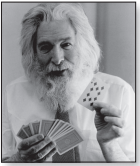About a year ago I read the experimental philosophy of “The
Mind’s I” and enjoyed it so much that I decided to follow up with some of its
selected authors, and Raymond Smullyan was a first stop. To be honest, at the
start of The Tao Is Silent, I wasn’t
sure if Smullyan was a joke or not. No doubt, as a mathematician he’s clearly a
genius, but the tenor of the book seemed so blithe that I didn’t know how
seriously he expected his readers to take him. I’m still not entirely sure he
doesn’t think Taoism is completely hilarious as a philosophy of non-philosophy and
an absurd parody of religion. The book is full of existential riddles,
punchlines, and paradoxes that stretch the mind and loosen our grip on our
stubborn biases about what life is, who we are, who god is, and what the ‘answers’
to our problems are. After getting used to his style, I realized that Smullyan
is smiling straight through the confused questioning of humanity, and asking
his readers to breathe for moment, and think in a purer air before working
towards answers. At the end of the book, I was pretty sure he was legit as a
thinker and philosopher, even though I never successfully determined which
parts were sarcastic and which were completely sober. As far as the latter,
probably none were entirely so.
His treatment of Taoism is less like a lesson than a game.
Smullyan unasks more questions than he answers, but I think that is EXACTLY his
point, and the point of Taoism. It is a perfect demonstration of the unraveling
of tangled logic. In the style of Alice In Wonderland, he helps us see what
fools we become when dogmatism creeps into ethics, religion, philosophy, politics,
education, etc. He uses Taoism to illustrate
that we know more than we think [sic], and that the good is often much nearer
to us than social reform theories might lead us to believe. He wants us to
believe that we do what we do because it’s who we are and we can’t help it.
Except when we can. Yeah, it gets tricky, but Smullyan is not interested in
resolving contradictions for anyone. He loves it this way, and he makes me
think that he loves it this way because he loves life, and life is this way. Matter
of fact, he seems completely satisfied with apparent contradictions, believing
that there may or may not be an explanation after all. “I wish to accept all
religions, even though they contradict each other...pick the finest veins, and
synthesize them as well as I can.”
I thought at first that he was an absolute pacifist, and possibly
an absurdist, but I think he’s simply interested in breaking down illogic and dispelling
presumption before proposing a solution. He quotes George Berkeley’s criticism
of philosophers, “They first raise a dust, and then complain they cannot see.”
Of course, Smullyan would be the one to play games and antagonize others in the
dust storm before helping to clear people’s view, yet even that may be a very
strategic move in motivating people to sit still long enough for their
confusions to settle so he can help. It’s no jest to say that this is one of
the most playful books from a very serious thinker that I have read in a long
time, and it almost threw me completely, as it may others. One could very
nearly miss the real gold here.
Smullyan is an optimist. It is evident he believes that
people will be more effective if they are happy in life, and they will be more
happy if they believe in themselves and do what comes natural (and that paradoxically
includes what often appears to be ‘going against nature’). It is very Buddhist
in that it attempts to go beyond mere right thinking and right action, to
reestablishing right view. “When the wrong man does the right thing, it usually
turns out wrong.” Taoism, he says, may not always change the practical
lifestyle of some, but they may now live “with less fear and anxiety.” There is
no coercion in Taoism. “The whole idea of Taoistic politics is that the
sage-ruler influences the people to voluntarily
do that which is good for them.”
Again, the real gem here is the permission to release our
death-grip on sanity and logic, and to simply live with the confidence that the
mechanism of our body and the world is rolling in the right direction somehow. This
confidence in ourselves, and a simple acceptance of and joy in existence, is
what Smullyan thinks will right most wrongs—wrongs which accumulate into the
only real ‘evil’: suffering. He willingly accepts that this is a form of
mysticism, stating that “metaphysics is the necessary ripening process of the
human race to prepare it for mysticism.”
And what mysticism doesn’t cover, a buoyant absurdity does. “Someone
asked a Zen-Master, ‘What is the ultimate nature of reality?’ The Master
replied, ‘Ask the post over there.’ The man responded: ‘Master, I don’t
understand!’ The master said, ‘Neither do I.’”
My favorite chapters,
and well worth an isolated read by curious people, are:
Is God a Taoist?
An imaginary Zen story.
The Evening Cool.


No comments:
Post a Comment